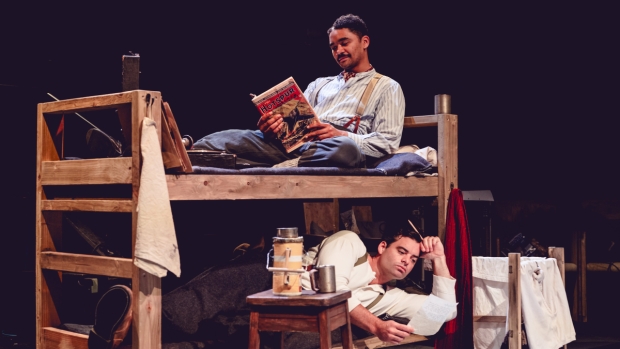”Tom, Dick and Harry” at Alexandra Palace Theatre – review

© Andrew Billington
Contrary to the message of this show, resistance is futile. There might already be the beloved 1963 film The Great Escape, but this version is a surprisingly welcome addition to the canon telling the story of the Allied prisoners of war escaping from the Luftwaffe camp Stalag Luft III in 1944. It’s simply too amiable and earnest to resist.
As the jolly Allied men get to work making full use of all of their abilities (tailoring, inventing, boxing) in digging and concealing the three tunnels which give their names to the play, and imagining how to make their getaway afterwards, there’s a prevailing air of gentle tomfoolery. It’s direct humour: German guard Giesler (David Fairs) is driven to sneering fury by his conviction that something’s afoot and by his superiors’ dedication to proper mime practice, audience members are appointed to help the men by ‘whittling’ a replica gun or raising the alarm when a German soldier approaches.
Cosiness wins out: there’s a lightness and fondness to all of the relationships here, even a weirdly tender one between the rakish, absurdly clean-cut RAF squadron leader and escape aficionado Ballard (Dominic Thorburn) and German camp head Lederman (Andrew Pollard, also a writer). Director Theresa Heskins (the other writer, along with actor Michael Hugo) and movement director Beverley Norris-Edmunds whisk the men about with Laura Willstead’s nimble set, most prominently featuring hatches down into the raised stage for the all-important tunnels.
There are chirpy musical interludes led by Sam Craig’s Jamaican CJ, one of a few soldiers who winningly drags up for a Christmas revue in the camp’s custom-built theatre. (There’s a cheerful repeated song about the Geneva Conventions, which are to be horribly ignored later.) Composed and directed by James Atherton, these songs are sweet enough, but it’s when the ticking score is overlaid with the soldiers singing gospel as cover for the sounds of digging that the music feels most at home and irrepressible.
There are turns into darkness, references to the real death and torture facing the POWs and rage from Giesler over what he sees as the preferential treatment the Allied prisoners get compared to his starving, bombed-out people, left to ring out unanswered. When Bob (Hugo) takes over the later part of the play to tell his own story of escape, Daniella Beattie’s lighting is striking with more colours for the outside, hostile world, flicking in angular, dangerous shafts.
Transferred from the in-the-round theatre at the New Vic in Newcastle-under-Lyme, where Heskins is artistic director, to the usually end-on Alexandra Palace Theatre, every seat in the house should have a searchlight-clear view of the action, despite some problems with audibility. The projections by the brothers Illuminos – often lighting up with secret case file information while a hero salutes and introduces himself, or displaying calculations inside Ballard’s mind – are charmingly goofy, but harder to see closer to the stage than at a further remove. There’s the sense that this production would feel as if it was bursting out of a smaller venue like the New Vic, with its dashing energy, while here it echoes and loses us a little.
But it’s just so hard to resist the sheer good nature at play here, despite even the overlong running time. Creaky characterisations by national stereotypes be damned, never mind the moments of sharply skidding mixes of tone, or the unrepentant cheesiness at times. Perhaps it shouldn’t work: yet even here, it mostly does. It’s a delight.












